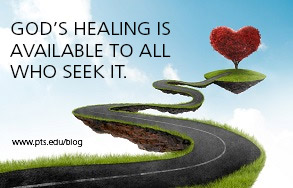Within the ministry of pastoral care, healing from brokenness is a central goal, both for individuals and for the families of which they are a part. Although pastoral care can certainly be extended at times of great joy in a family’s life (such as at the time of a marriage or the birth of a new baby), families most often feel the need for pastoral care and counseling during experiences of brokenness in their lives together. Of course, brokenness within a family may take many forms: caring for an elderly parent; grief following the death of a loved one; divorce or familial estrangement; the loss of a job; abuse or violence.
In the midst of such experiences, individual pastoral caregivers and caring faith communities are called to facilitate healing in families’ lives. Healing, in this sense, focuses on the restoration of wholeness and fullness of life, and does not necessarily mean “cure.” In other words, it may not always be possible to fully restore a family’s health or wholeness, or to reverse the family’s current situation in any meaningful way. Instead, in this way of thinking, healing means helping people overcome an impairment by helping to lead them to a place beyond their previous condition. It may also mean assisting families to move to a higher level of spiritual insight and awareness of God’s love by integrating their experiences of brokenness with their faith.
To be clear: healing does not come directly from individual caregivers or faith communities, or from any particular approach they might take in their pastoral care ministry. It is God who heals, but there are many things caregivers and communities can do to facilitate healing in the lives of the families they serve. Here are just a few examples of what this healing work might look like:
- Developing a pastoral care network in your congregation so that lay people can be trained to care for one another more effectively, even as care is also provided by those serving in official pastoral roles. Stephen Ministries is one of the most comprehensive and well-respected programs for training members of faith communities in pastoral care, but there may be other good programs available in your area. If you’re not sure where to start, consider contacting the local judicatory staff for your church’s denomination to see if they have specific recommendations.
- Including attention to the reality of family brokenness in the worshipping life of the community, perhaps by naming some of these struggles in the prayers of the people, in pastoral prayers, or in sermons. For many families, having their challenges acknowledged (in a general way) in worship helps them to feel less alone, and to let go of the notion that church is for perfect people. One of the most powerful ways of helping families heal may simply be communicating, in worship and in other places in the congregation’s communal life, that you don’t need to “have it all together” before coming to church.
- Hosting support groups in your church for various kinds of family issues (grief, divorce, parenting, etc.) You may have people on your congregation’s staff with the expertise to run these groups themselves, or you may simply wish to invite community organizations to consider holding their support group meetings in your space and making sure your members know such groups are available. Either way, this can be another important means of conveying that the church is a place for people to bring their whole selves, and that healing can be found in the midst of the faith community.
Just as family brokenness can take many forms, healing from brokenness can take many forms as well. The key is to figure out what kind of healing work makes most sense in your own ministry context. In the end, the goal is not to take one particular approach in our ministries of pastoral care and counseling, but simply to make sure we are communicating—as individual caregivers and as caring Christian communities—that the lives and struggles of families are important to us, and that God’s healing is available to all who seek it.
The Rev. Dr. Leanna K. Fuller is associate professor of pastoral care at Pittsburgh Theological Seminary and teaches in the MDiv Program. Her ministry experience includes serving as associate pastor of Oakland Christian Church in Suffolk, Va., where she coordinated youth ministry and Christian education programming. She writes regularly on pastoral care and counseling, pastoral theology, and congregational conflict, and she’s the author of When Christ’s Body is Broken: Anxiety, Identity, and Conflict in Congregations (Wipf and Stock, 2016).


Dear sirs,
I would like to bring to your notes about COVID 19. In our area many people are not having food because of Covid19, here our Government lock down everything, because of this problem all our church family’s and community people as well as street people struggling for food.
When I am seeing this needs my heart is so heavy. So I would like to mention if it’s possible please help in this situation and blessed with food.
Thank you.
Yours in Christ.
Rev. P.Devadanam.